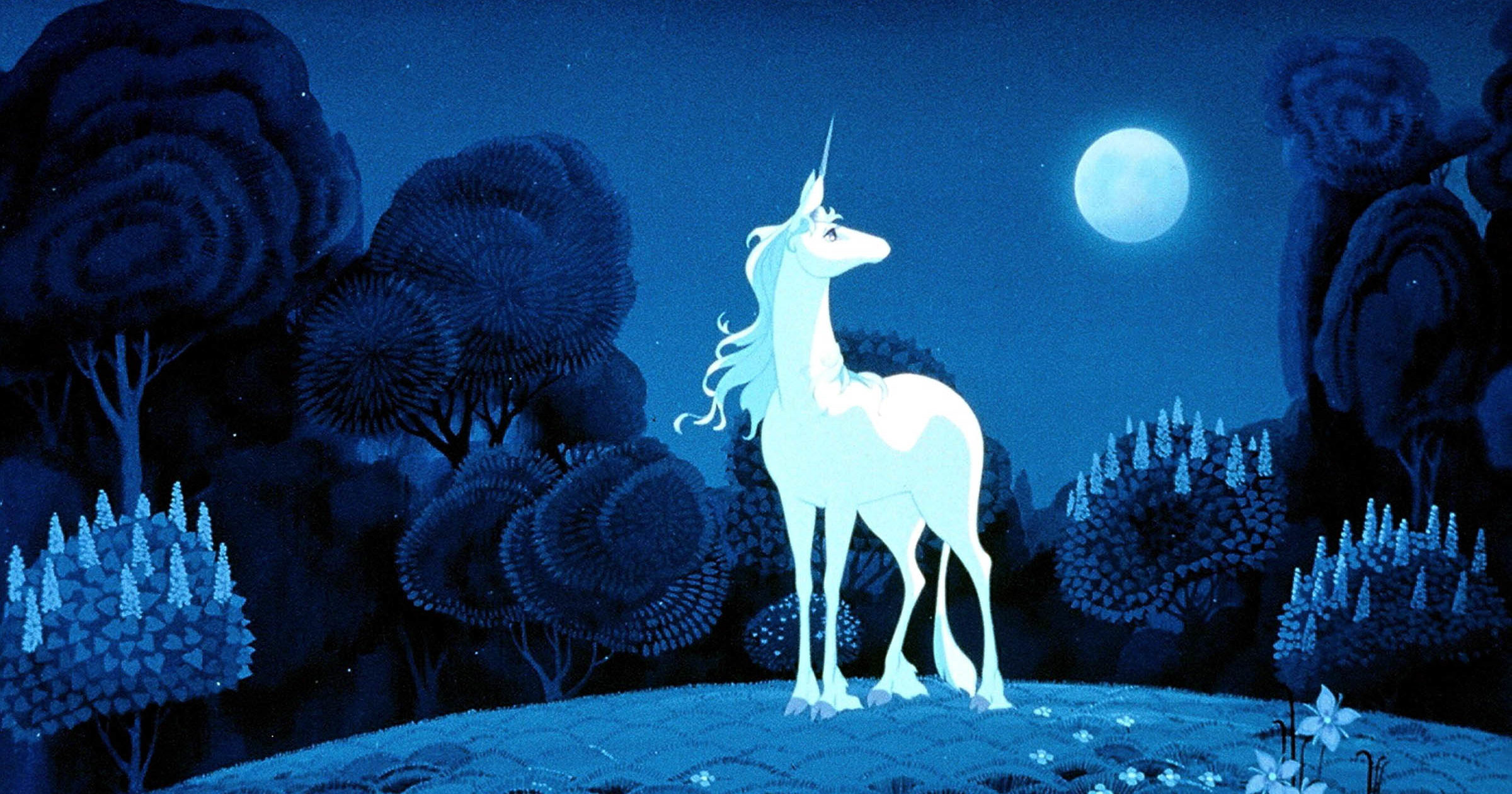
The movie The Last Unicorn, based on the novel by Peter S. Beagle, is surprisingly beautiful and moving, particularly for a children’s cartoon from 1982. Science fiction author Matthew Kressel says that the story draws much of its power from the way it tackles the reality of loss and regret.
“The best stories, like the best myths, operate on a subconscious level, and I think that’s why it’s so effective, is it’s hitting a lot of these universal emotions that we all feel,” Kressel says in Episode 413 of the Geek’s Guide to the Galaxy podcast.
TV writer Andrea Kail agrees. As a teenager she was unimpressed with The Last Unicorn, but found it much more moving as an adult.
“You learn what regret is as you get older,” she says. “When I was a kid, it didn’t mean anything to me because I didn’t understand regret, I didn’t understand sorrow, I didn’t understand loss. And now as a middle-aged person, I do understand all those things, so it has meaning for me.”
Geek’s Guide to the Galaxy host David Barr Kirtley notes that the film’s poetic language really sets it apart from similar films such as The Black Cauldron and The Flight of Dragons. “You can tell it’s based on a book,” he says. “There’s just something literate about the film. The dialogue is really amazing, and it just taps into the idea of myth and stories, and what they mean to us, and whether we can believe them.”
The film also features a stellar voice cast that includes Mia Farrow, Jeff Bridges, and Angela Lansbury. Humor writer Tom Gerencer was particularly impressed with Christopher Lee, who plays the grim and melancholy villain King Haggard.
“Christopher Lee was apparently a big fan of the book, and he showed up to the recording sessions with an annotated copy of the book that he had made notes in, that he would show to the director and be like, ‘We have to have this part. This part has to be in the scene,’” Gerencer says. “So he was all about this movie, apparently.”
Listen to the complete interview with Matthew Kressel, Andrea Kail, and Tom Gerencer in Episode 413 of Geek’s Guide to the Galaxy (above). And check out some highlights from the discussion below.
Tom Gerencer on Heavy Metal:
“One of the things that makes it not age well is I don’t think the audio comes across any more. Something happened to it, or maybe it was just the way I watched it. But when I was a kid, half of it was about the music. These were all big-time hit songs that everybody loved back then, really popular songs, and a VHS tape has really good audio, because it’s super-thick tape—it’s got a lot of bandwidth for audio. And I feel like that gets lost, even in digital, which ought to be good. But back then on a VHS, with a decent speaker system, you’d be watching it in your living room, and the sound of these musical pieces would just fill the room. And that was a big part of it.”
David Barr Kirtley on The Flight of Dragons:
“There was this guy Peter Dickinson, and from what I gather he had written an actual nonfiction book about how he thought dragons had really existed in history, and he had all these scientific rationalizations for how they could have flown and breathed fire. … He basically posits that dragons were sort of like blimps, that somehow they have hydrogen gas inside them and set some of it on fire, and that helped them float like balloons, so they didn’t use their wings really for lift. So that was kind of clever, and also the part where he says dragons sleep on gold because they can’t sleep on anything non-metallic, because they set it on fire, and then gold is this soft, comfortable metal to sleep on. That’s actually pretty clever.”
Matthew Kressel on The Black Cauldron:
“I have this problem with a lot of Disney movies—not so much their latest stuff—but basically it’s stories about narcissistic children going off on quests. So basically this wizard entrusts [Taran] with the biggest secret the world has. ‘Don’t tell anyone that this magic pig can lead the way to the evil black cauldron. I’m sending you off into the woods with this piglet. Be safe!’ And then immediately, the first thing the kid does is he loses the pig while he’s dreaming about how one day he’s going to be famous. He literally stares into his own reflection, like the Narcissus image. … There was something just really irritating about him.”
David Barr Kirtley on The Last Unicorn:
“One thing that really struck me from this movie, as a kid, was this image of Prince Lir, where he writes poetry and fights dragons. And I was totally like, ‘That’s who I want to be when I grow up. I kill dragons and I write poetry.’ It’s funny what can have a huge impact on you when you’re that age. Also I had this image of Prince Lir as this warrior-poet kind of guy, and it was weird to go back and watch the movie later and be like, ‘Oh, he’s actually not a writer at all.’ He’s trying to write one sentence, and it’s bad, and he crumples up the paper. I had much more of an image of him as a poet than I think the movie really justifies.”
